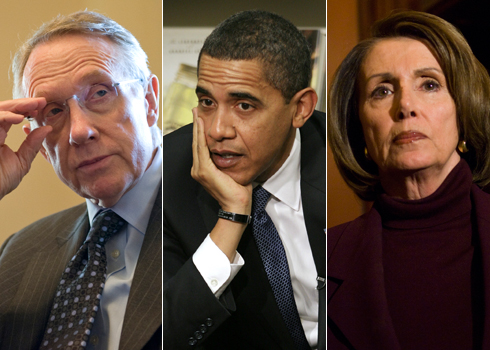All the news coverage these last few days has focused on the developments in the Senate Finance Committee. And for good reason! That’s where all the news is. But that may obscure the fact that there’s another health care bill that’s been voted out of the Senate Health, Education, Labor, and Pensions Committee, and a final package emerging in the House of Representatives, and each of these will help shape the bill President Obama hopes to sign.
Before August recess, each of the three House committees with jurisdiction over health care reform approved different versions of the same so-called “tri-committee bill”. Over the break, the chairmen of those committees, working with leadership and the Democratic caucus, made progress on stitching those bills together into a package that will be voted on by the entire chamber. That work continues, and yesterday, Speaker Nancy Pelosi said the House will pass a bill “when we’re ready,” but that she’s not waiting for the Senate to move ahead first.
Things haven’t matured quite that much in the Senate. The Finance Committee will hold hearings on its bill next week, and the current thinking is that the legislation will likely pass with only Democrats (or Democrats plus Republican Olympia Snowe of Maine). When that’s done, Senate Majority Leader Harry Reid–working with Finance Chair Max Baucus, HELP Comittee leaders, and the White House–will take the lead merging the two bills into a final product that he thinks can overcome a filibuster, and then pass with at least 51 votes. This will mostly happen behind closed doors.
Assuming success in the Senate (still a pretty big assumption) that bill will have to be merged with the House bill. This is where the fight over the public option is likeliest to boil over. House progressives have insisted that health care legislation include a public option, while Senate centrists seem prepared to kill just such a bill. One of those two factions will likely have to agree to settle. That will be a political decision, and it will be ugly no matter who wins.
Of course, this wouldn’t be Congressional politics if there weren’t a couple significant caveats to all this: First, the Massachusetts legislature is expected to pass a law allowing Gov. Deval Patrick to appoint a temporary replacement for Ted Kennedy, who died of brain cancer last month. Assuming all goes smoothly and Patrick follows through, Democrats will once again have 60 votes in the Senate. That would significantly change the dynamics of the health care negotiations. In at least a technical sense, Snowe would no longer be necessary to pass a bill: Democrats would be able to do it all on their own, as long as they stayed united against a Republican filibuster. The onus, in other words, would be shifted to conservative Senate Democrats–not Snowe. But they’d still maintain significant leverage.
Secondly, if at some point in this long, involved process, it becomes clear that Democrats don’t have 60 votes to overcome a filibuster, then their energies will turn to the filibuster-proof budget reconciliation process. And that would touch off a very different legislative fight.
Got it? Good.










